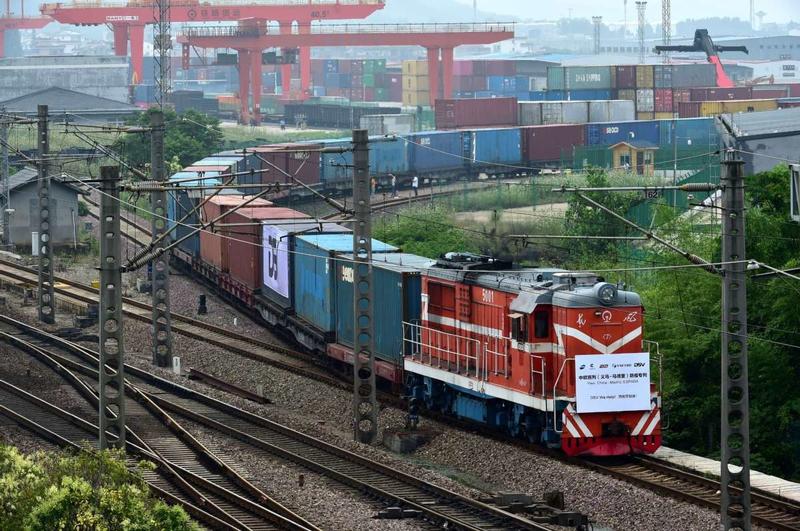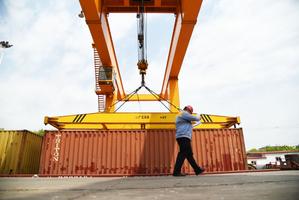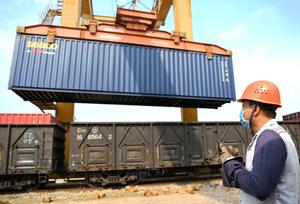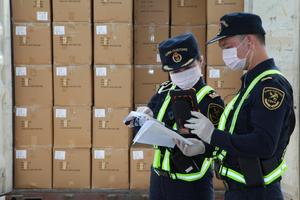Rail services are providing a vital cargo link across Eurasia during the global health crisis
 A train loaded with medical equipment, including surgical face masks and protective gowns, departs Yiwu, Zhejiang province, for Madrid, Spain, last month to help in the fight against the COVID-19 pandemic. (LYU BIN / FOR CHINA DAILY)
A train loaded with medical equipment, including surgical face masks and protective gowns, departs Yiwu, Zhejiang province, for Madrid, Spain, last month to help in the fight against the COVID-19 pandemic. (LYU BIN / FOR CHINA DAILY)
Having departed from Nanchang, capital of Jiangxi province, a cargo train loaded with COVID-19 protective equipment and materials arrived in Paris on June 23, reflecting the close cooperation between China and Europe.
The train, one of many China-Europe express services for the transportation of much-needed medical supplies, traveled 11,920 kilometers across seven countries before delivering some 20 million surgical masks and gloves, water-soluble bags, contactless gel dispensers and other resources.
The delivery marked the first direct, dedicated rail service for protective materials from China to France amid the pandemic.
In the meantime, two additional China-Europe freight trains, carrying supplies to aid the fight against the novel coronavirus, were on their way to Duisburg, Germany, and Madrid, Spain.
 A police officer checks the ID card of a cargo train driver at the China-Mongolia border on July 1. (GUO PENGJIE / FOR CHINA DAILY)
A police officer checks the ID card of a cargo train driver at the China-Mongolia border on July 1. (GUO PENGJIE / FOR CHINA DAILY)
'Green passages'
Since the outbreak started, the freight trains have been playing a crucial role in supporting Europe's anti-epidemic fight by opening "green passages" for the transportation of important supplies and raw materials.
From January to May, trains carried about 12,520 metric tons of materials to fight the epidemic from China to European countries.
Lyazid Benhami, vice-president of the Paris Association of French-Chinese Friendship, was delighted to witness the June 23 arrival.
"In this health crisis, we are pleased to note that this important cargo of materials transported (to France), including 20 million surgical masks and protective equipment, will help meet the demand and needs of consumers and the market," he said.
Yao Hongzhi, general manager of the COSCO Shipping (France) Agency, said the smooth operation of the supply trains has proved the feasibility, punctuality and safety of the land corridor, which has lower delivery costs than air freight and shorter journey times and greater flexibility than sea freight.
 A member of staff examines a cargo of medical gloves in Shandong province before it leaves for Budapest, Hungary, in April. (WANG KAI / XINHUA)
A member of staff examines a cargo of medical gloves in Shandong province before it leaves for Budapest, Hungary, in April. (WANG KAI / XINHUA)
"Against the backdrop of current international anti-pandemic cooperation, the China-Europe freight trains have fully demonstrated their advantages in transporting medical materials," Yao said.
Carrying 35 containers of control and prevention materials, all manufactured in the central Chinese province of Hubei, a freight train from Wuhan, the provincial capital, headed for the German city of Duisburg, a logistics hub in central Europe, before carrying on to Hamburg.
"The original mode of transportation to Europe was container ships, but now the products need to be delivered as quickly as possible," said Gao Zandong, deputy general manager of COSCO Shipping Lines (Wuhan).
Gao noted that it only took about 10 days to transport the goods from Hubei to Germany.
On June 29, Madrid greeted a freight train from Yiwu, in East China's Zhejiang province, carrying 86 twenty-foot equivalent unit containers holding about 257 tons of cargo, including 25 million face masks and 400,000 protective suits.
Carlos Santana, a representative of the company that operates the Yiwu-Madrid line in Spain, told Xinhua that railway transportation has proved a reliable way of carrying health materials from China in the midst of the pandemic.
Wu Haitao, China's ambassador to Spain, said the Yiwu-Madrid express carrying medical materials is proof of international cooperation in the fight against the coronavirus.
 Containers filled with surgical masks are loaded onto a Russia-bound train in Jiangxi province in May. (HU GUOLIN / FOR CHINA DAILY)
Containers filled with surgical masks are loaded onto a Russia-bound train in Jiangxi province in May. (HU GUOLIN / FOR CHINA DAILY)
Economic benefits
In addition to making a contribution that underpins the coronavirus battle, the rail connection between China and Europe has brought momentum to the resumption of economic activities across Eurasia by stabilizing trading activities and supply chains.
From January to May, the number of China-Europe freight trains surged by 28 percent year-on-year, while shipments rose by 32 percent, according to the China State Railway Group.
The freight trains made 1,033 trips in May, a year-on-year rise of 43 percent, and transported 93,000 TEUs, a record number for the line.
Benhami, from the French-Chinese friendship association, said the freight trains provide an opportunity to boost trade between France and China, adding that "the 'win-win' approach is very real for everyone, including the environment, businesses and consumers".
Xulio Rios, director of the Observatory of Chinese Politics in Spain, said the Yiwu-Madrid railway link offers an important route for cargo, from medical materials to everyday items, during the COVID-19 crisis.
From Santana's perspective, rail transportation from Asia is upgrading from moving small, low-cost goods to delivering items with added value as China is exporting related goods in greater quantities, such as watches, Bluetooth devices, automobile parts and electrical goods.
He added that top-end consumer goods-such as extra-virgin olive oil, wine and cured ham-are also brought from Spain to China by rail, with clear advantages of speed, environmental safety and low costs.
Laszlo Mosoczi, secretary of state for transport policy at the Hungarian Ministry of Innovation and Technology, said, "As a transit country, Hungary benefits from freight traffic from Asia to Europe, and Hungary can become the logistics center of the region."
 Customs officers inspect boxes of protective goggles in Guangdong province before they are shipped to Kazakhstan in April. (LIN WENJUN / FOR CHINA DAILY)
Customs officers inspect boxes of protective goggles in Guangdong province before they are shipped to Kazakhstan in April. (LIN WENJUN / FOR CHINA DAILY)
Post-pandemic prospects
Speaking last month, during a video conference with European Union leaders, President Xi Jinping said China is willing to join hands with the European side to push for a more stable and mature relationship in the post-pandemic era and lift bilateral ties to new heights.
"Our two major economies should play the role as dual engines of the world economy, drive the recovery of the global economy, jointly support a scientific and orderly resumption of work and production, strengthen macroeconomic policy coordination, and keep global industrial and supply chains stable and smooth," Xi said.
Amid efforts to expand common interests in China-EU cooperation, the China-Europe rail transport service, which was initiated in 2011, is expected to play an increasingly important role in the post-pandemic era.
The freight trains that link China and Europe have become symbols of mutual benefit, Rios said.
Benhami said, "If we refer to the ongoing Belt and Road Initiative, we notice that the land route brings hope for both French and Chinese companies." He added that the initiative brings new opportunities for economic development.
Wu, the ambassador, said the Yiwu-Madrid line can play an important role in cross-border e-commerce between China and Spain.
He stressed that local governments and companies in Spain have shown a positive attitude toward strengthening cooperation on the "Yixin'ou" (Yiwu-Xinjiang-Europe) cargo line by expanding exports to China in a more convenient manner.
Xavier Wanderpepen, who is responsible for China-Europe rail freight activities at Forwardis, a subsidiary of France's national railway company SNCF Logistics, said: "We wish to offer French and Chinese companies occasional train solutions, and we wish to work with China on the development of freight wagons with variable gauges capable of adapting to the situation in Western Europe, Russia and China. In a few years, we will be able to connect China and Europe in 10 days."


